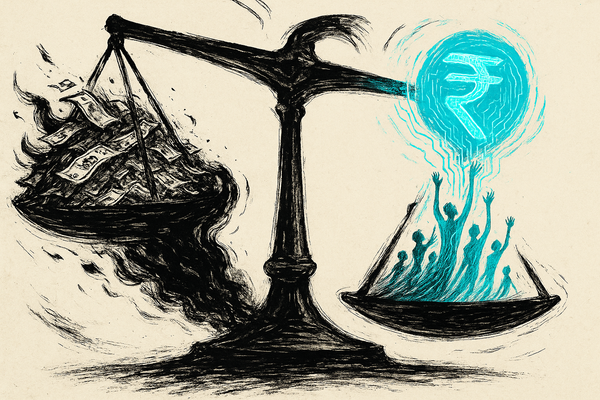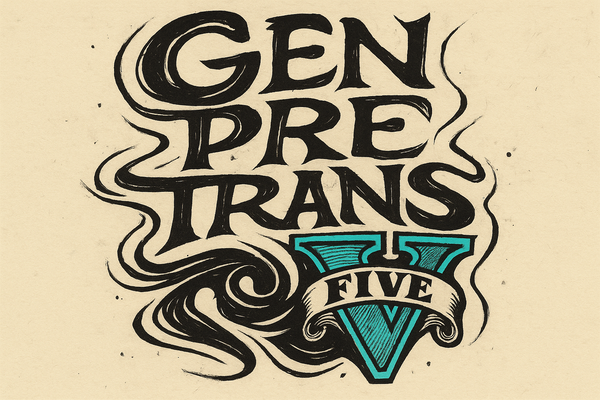ImaginEconomy Daily #7
Your boss calls with an urgent request. Perfect voice, same laugh. Except it's a $5 AI clone. Welcome to 2025: State Dept hacked by fake voices. Meta pays $100M for talent. AI does 30% of work. When everything's fake, being real is your only edge. Trust is the new oil—and we're running out.

ImaginEconomy 🧠 ✨ 💰 : Brands, Strategy, Story and Design in the Age of AI
AI Voice Clones Infiltrate U.S. Government
Attackers successfully used an AI-generated voice clone of Secretary of State Marco Rubio to contact five high-level officials via Signal, including a U.S. governor, a member of Congress, and three foreign ministers. The perpetrators needed only 15-20 seconds of publicly available audio to create the fake, with the FBI warning of an active campaign targeting senior officials since April. Deloitte projects AI deepfake fraud could lead to $40 billion in losses by 2027.
ImaginEconomy Impact: The era of "trust but verify" just became "verify everything, trust nothing." For brands, this isn't just a security threat. It's an existential crisis of authenticity. When a $5/month tool can perfectly mimic your CEO's voice, every client call, every internal meeting, every brand message becomes suspect. Smart agencies will start implementing voice authentication protocols now, before their biggest client gets a call from their "account director" requesting an urgent wire transfer. The winners will be those who turn this paranoia into opportunity: imagine being the agency that guarantees every interaction is cryptographically verified human-to-human.
Source: Washington Post on AI voice clone attack
Meta Raids Apple's AI Leadership
Meta recruited Ruoming Pang, Apple's head of AI models, as part of an aggressive talent war that includes $100 million signing bonuses and personal WhatsApp recruitment messages from Zuckerberg through his "Recruiting Party 🎉" chat. At least 10 OpenAI researchers have already jumped ship to Meta, including the entire Zurich office, while OpenAI reports stock compensation soared to 119% of last year's revenue.
ImaginEconomy Impact: When tech giants are throwing $100M at individual humans, what chance do agencies have? Here's the thing: you can't outbid Meta, but you can out-culture them. Seek those for whom work is not only about money, but also about meaning. While big tech hoards AI PhDs, smart agencies should focus on hybrid talents: creatives who code, strategists who prompt, designers who train models. The real competitive advantage isn't having the best AI talent; it's having humans who know how to make AI talent sing.
Source: TechCrunch on Meta recruiting Apple's AI head
Chinese AI Wars: Kimi Researcher vs. Model Theft Scandal
Moonshot AI launched Kimi Researcher, performing 23 reasoning steps and crawling 200+ URLs per query, beating OpenAI's o3 on key benchmarks with a state-of-the-art 26.9% on Humanity's Last Exam. Hours before launch, Huawei was forced to deny allegations that its Pangu models are cloned versions of Alibaba's Qwen, with GitHub analyses showing suspiciously similar code.
ImaginEconomy Impact: While Silicon Valley plays musical chairs with talent, China is building research tools that might make ChatGPT look like a calculator. Kimi Researcher doesn't just answer questions; it conducts deep investigations. For strategists drowning in research requests, this changes everything. But the model theft scandal reveals a darker truth: in the AI gold rush, intellectual property is under attack and even closely guarded models are at risk. Brands need to stop thinking about protecting their AI models and start thinking about creating symbiotic Human-AI workflows and value that perfect clones can't replicate.
Source: MarkTechPost on Kimi Researcher
OLMo 2 Challenges OpenAI
Allen AI released OLMo 2, the first fully-open language model to outperform GPT-3.5 Turbo and GPT-4o mini on popular benchmarks. The 32B parameter model comes with complete transparency—all training data, code, and weights are publicly available, challenging the closed-source approach of major AI companies.
ImaginEconomy Impact: The open-source rebellion is here, and it's speaking fluent business. OLMo 2 proves you don't need OpenAI's black box to build world-class AI experiences. For agencies tired of API costs eating their margins, this is liberation day. But the real opportunity full customization with full transparency. Imagine training models on your agency's decade of award-winning work, your clients' brand voices, your cultural perspectives. The future belongs to agencies that stop renting intelligence and start owning it.
Source: Allen AI OLMo 2 release
OpenAI Tightens Security Amid IP Concerns
OpenAI implemented "information tenting" policies limiting access to sensitive algorithms, moved proprietary technology to offline computers, added biometric access controls, and established a "deny-by-default" internet policy after alleging DeepSeek improperly copied its models through distillation techniques.
ImaginEconomy Impact: OpenAI just admitted what we all suspected: the AI emperor has no clothes, and now they're desperately sewing new ones. This security theater reveals the industry's dirty secret—these "revolutionary" models might just be sophisticated remixes of each other. For brands, this is actually good news. If even OpenAI can't protect its secret sauce, then competitive advantage doesn't come from having exclusive AI access. It comes from how you use universally available tools in uniquely creative ways. Stop chasing the latest model and start mastering the craft.
Source: TechCrunch on OpenAI security measures
AI Companies Capture Half of Q2 Venture Funding
AI companies captured nearly 50% of the $91 billion in venture funding during Q2 2025, according to Crunchbase data, marking an unprecedented concentration of capital in artificial intelligence startups.
ImaginEconomy Impact: Half of all venture money is chasing AI dreams. For the creative industry, this creates a dangerous dynamic: too much capital chasing too few genuine innovations. We're about to see an explosion of AI-powered "revolutionary" marketing tools that are just ChatGPT with a fancy UI. Smart agencies should resist the FOMO. The real opportunity isn't in building the next AI unicorn—it's in being the trusted guide who helps brands navigate the coming AI tool apocalypse. Become the sommelier of AI solutions, not another vendor in the noise.
Source: Crunchbase on Q2 AI funding
Truth Social Files for Crypto ETF
Trump's Truth Social filed with the SEC to launch a "Crypto Blue Chip" ETF with initial allocations of 70% Bitcoin and 15% Ethereum, following earlier applications for spot BTC and BTC+ETH ETFs.
ImaginEconomy Impact: When social media platforms pivot to crypto ETFs en masse, you know we've reached peak financial FOMO. This collision of tech, politics, and finance reveals that the lines between platforms, currencies, and communities are dissolving. For brands, this means your competitors might come from anywhere. Today's meme stock is tomorrow's payment processor is next week's AI platform. The only defense is radical focus. While everyone else chases every shiny trend, double down on what you do best. In a world of infinite pivots, consistency becomes the ultimate differentiator.
Source: Crypto report on Truth Social ETF filing
AI Cracks 30% of Workplace Tasks
New AgentCompany benchmark reveals current AI agents can autonomously handle up to 30% of simulated workplace tasks. But entire jobs with task orchestration, constant communication and judgment calls are harder, suggesting we should focus on well-organized task-level automation and coordination rather than assuming entire professions or people will be automated.
ImaginEconomy Impact: AI is not coming for your job, for now. But if you let it, it can come for your for your boring Tuesday with afternoon crashes. This 30% figure is the sweet spot where AI becomes transformative without being threatening. For agencies, this means liberation from the grunt work that kills creativity. But if AI handles 30% of tasks, the remaining 70% can and should be better than thus far: the bar for human work just got higher. Agencies that use AI to eliminate busy work while elevating human creativity will thrive. Those that use it to only cut costs and coast? They're already obsolete.
Source: AgentCompany benchmark paper
Bottom Line: The Authentication Economy
Today's stories paint a portrait of an industry in identity crisis. Voice clones impersonate world leaders. Tech giants steal each other's people while accusing each other of stealing models. Open source challenges closed gardens. And through it all, money floods in like there's no tomorrow.
The common thread? Trust is the new oil, and like oil, it's getting scarce.
When you can't trust a voice, a model's origin, or even your own team's loyalty, what's left? The answer: radical transparency and human accountability. The brands that win won't be those with the best AI or the deepest pockets. They'll be those brave enough to show their work, verify their humanity, and create Human-AI joint value that no algorithm can fake.
The future belongs to the verifiably, transparently, unapologetically real.
ImaginEconomy Daily Newsletter is curated for brand, business and marketing strategists, creatives, and leaders navigating the intersection of technology and human experience.




